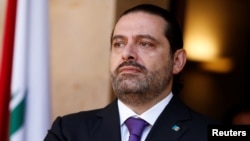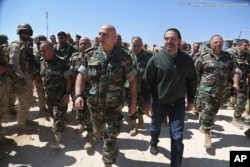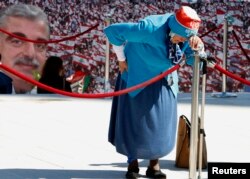Lebanon's Hezbollah group is accusing Saudi Arabia of forcing Prime Minister Saad Hariri to resign.
The head of Lebanon's Shi’ite Hezbollah movement, Hassan Nasrallah, said Sunday the group that participated in Hariri's government during the past year had not pushed for the resignation.
"It is clear that the resignation was a Saudi decision that was imposed on Prime Minister Hariri. It was not his intention, not his wish, and not his decision" to quit, Nasrallah said in a televised address.
Hariri announced his resignation Saturday, after delivering a blistering attack on Iran and its proxy militia, Hezbollah, both in Lebanon and across the region. The resignation followed consultations with Saudi Arabian leaders in Riyadh, and an earlier meeting with Iran’s top foreign policy adviser, Ali Akbar Velayati, in Beirut.
Lebanese President Michel Aoun indicated that Hariri’s office had called him from outside Lebanon to relay the news of his resignation. Commentators on Saudi-owned al-Arabiya TV stressed that Hariri’s resignation speech was made from the Saudi capital, Riyadh, and that it had “regional implications.”
Hariri blames Iran, Hezbollah
In his speech, Hariri accused Iran and its Lebanese proxy militia, Hezbollah, of creating discord in the country, as well as across the region.
He says that outside parties, alluding to Iran, that wish ill on Lebanon have sown sectarian strife among the Lebanese, gaining control of the levers of power, and setting up a state-within-a-state. He also accused Iran of meddling in the internal affairs of other Arab states, including Syria, Iraq, Bahrain and Yemen.
Hariri went on to claim the political climate inside Lebanon resembled the one that prevailed in the months before his father, the late Prime Minister Rafiq al-Hariri, was assassinated in February 2005, and that he sensed a “covert plot” against his own life. Arab and Lebanese media have long accused Hezbollah of killing the elder Hariri.
He added that the Lebanese people are “determined to be free and independent,” and he insisted the country must have “only one state, one army, and one set of arms.”
Hariri met Friday with Iran’s top foreign policy adviser, former foreign minister Ali Akbar Velayati.
New government unlikely soon
Hilal Khashan, who teaches political science at the American University of Beirut, tells VOA he thinks Hariri might have wanted to tell Iran he was not “seeking to escalate the conflict,” despite his impending resignation.
Khashan says he does not think a new government will be formed any time soon and that Hariri’s government will continue to govern in a caretaker capacity for a long time.
“We are used to having a caretaker Cabinet perform its functions for a year or so. So, it will be a long time before another Cabinet is formed [and] it will be a long time before another Sunni leader will accept to form a Cabinet. ... Otherwise, he would be labeled a traitor.”
Despite the sudden political storm, Khashan does not believe that it is “in the interest of either Iran, or Hezbollah to escalate tensions” following Hariri’s resignation.
Israel: a wake-up call
He said outside parties like Israel, however, are taking a more muscular attitude toward Hezbollah. He says recent Israeli “raids against Hezbollah (targets) in Syria ... mark an escalation in their attacks.”
He also points out that Israeli warplanes have been “making intensive overflights in the south of Lebanon during the past few days.”
Israeli Prime Minister Benjamin Netanyahu said Hariri’s resignation is “a wake-up call to the international community to take action against the Iranian aggression that is trying to turn Syria into Lebanon.”
The Israeli leader said, “This aggression endangers not only Israel, but the entire Middle East. The international community needs to come together and stand against this aggression.”
Bahram Ghasemi, Iran’s foreign ministry spokesman dismissed the resignation as a plot by the U.S., Israel and the Saudis to incite tensions in the region, according to the semi-official Iranian Tasim news agency.
Ghasemi said Hariri’s “baseless accusations” indicate that “a new scenario” for the region was being created.











